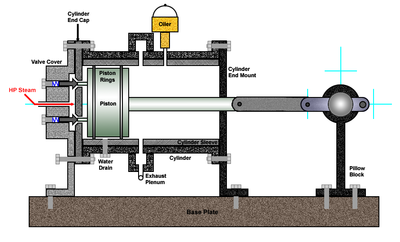Steam Engine: Difference between revisions
No edit summary |
No edit summary |
||
| Line 8: | Line 8: | ||
The Open Source Ecology project seeks to develop a modular, scalable, open source steam engine capable of converting steam generated by a solar collector or boiler into power that can be used to generate electricity or drive machines found in the [[Global Village Construction Set]]. | The Open Source Ecology project seeks to develop a modular, scalable, open source steam engine capable of converting steam generated by a solar collector or boiler into power that can be used to generate electricity or drive machines found in the [[Global Village Construction Set]]. | ||
==Details== | |||
== | |||
See [[Steam Engine Intro]] if you are interested in the current OSE steam engine project. | See [[Steam Engine Intro]] if you are interested in the current OSE steam engine project. | ||
| Line 28: | Line 18: | ||
* [[Steam Engine/Terminology]] - terms used in steam engine technology | * [[Steam Engine/Terminology]] - terms used in steam engine technology | ||
== | Steam engines take energy available as high pressure, high temperature steam and convert it into reciprocal motion. This motion can then be turned into rotational motion using a crankshaft. At the start of the twentieth century, steam engines provided power for farms, factories, and transportation. They were largely replaced by internal combustion engines. The Open Source Ecology project is interested in reviving steam technology to develop a modern steam engine to provide alternatives to engines driven by gasoline or diesel - which are becoming increasingly more expensive as our world passes the point of peak oil production. | ||
==Product Ecology== | |||
[[Image:File:3b-Solarenergyeco.png|thumb|600px|[[Steam Engine Product Ecology]]]] | |||
'''Made with''' | |||
*[[Induction Furnace]] - Steel | |||
'''Uses''' | |||
*[[Gasifier]] - Heat | |||
*[[Steam Generator]] - Steam | |||
*[[Solar Concentrator]] - Heat | |||
'''Creates''' | |||
*[[Electricity]] | |||
*[[Power]] | |||
= | ==Components== | ||
=Status= | ==Status== | ||
The Steam Engine is nearing the [[Steam_Engine/Manufacturing_Instructions|Prototyping phase of product development]]. Those interested in fabricating prototype should contact [[Mark Norton]]. | |||
==See Also== | |||
*[[Steam Engine Archive]] | |||
*[[CHP]] | |||
{{GVCS Footer}} | {{GVCS Footer}} | ||
Revision as of 21:02, 19 September 2011
| Steam Engine | ||
|---|---|---|
| Home | Research & Development | Bill of Materials | Manufacturing Instructions | User's Manual | User Reviews | 
| |
Overview
Steam Engine/Index - topical index to all steam engine pages.
The Open Source Ecology project seeks to develop a modular, scalable, open source steam engine capable of converting steam generated by a solar collector or boiler into power that can be used to generate electricity or drive machines found in the Global Village Construction Set.
Details
See Steam Engine Intro if you are interested in the current OSE steam engine project.
- Steam Engine Concept - a conceptual description of steam engines
- Steam Engine Breakdown -
- Steam Engine Specifications
- Steam Engine Specifications/Geometry
- Steam Engine/Terminology - terms used in steam engine technology
Steam engines take energy available as high pressure, high temperature steam and convert it into reciprocal motion. This motion can then be turned into rotational motion using a crankshaft. At the start of the twentieth century, steam engines provided power for farms, factories, and transportation. They were largely replaced by internal combustion engines. The Open Source Ecology project is interested in reviving steam technology to develop a modern steam engine to provide alternatives to engines driven by gasoline or diesel - which are becoming increasingly more expensive as our world passes the point of peak oil production.
Product Ecology
Made with
- Induction Furnace - Steel
Uses
- Gasifier - Heat
- Steam Generator - Steam
- Solar Concentrator - Heat
Creates
Components
Status
The Steam Engine is nearing the Prototyping phase of product development. Those interested in fabricating prototype should contact Mark Norton.
See Also
